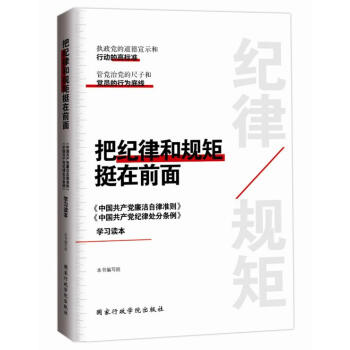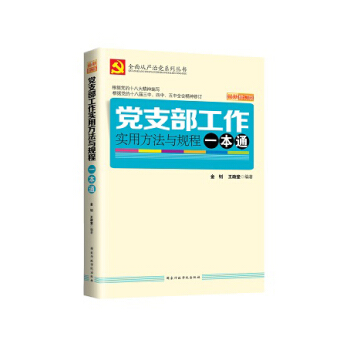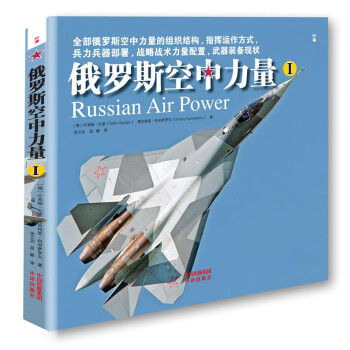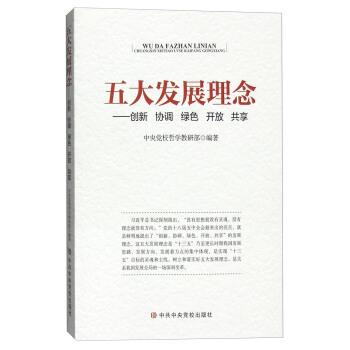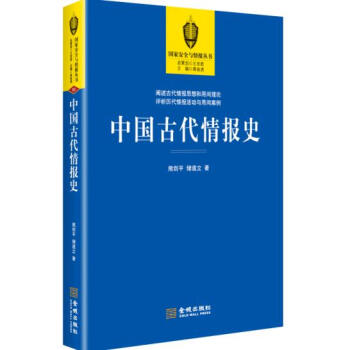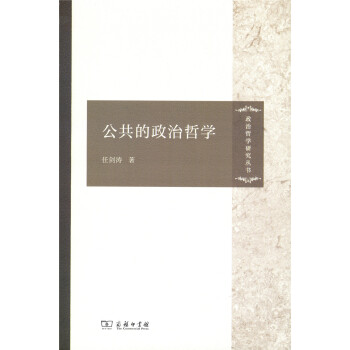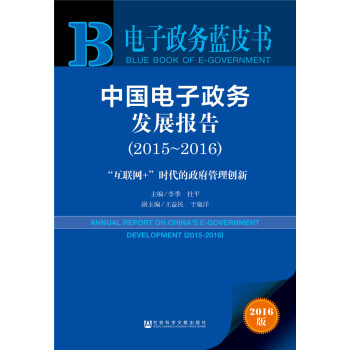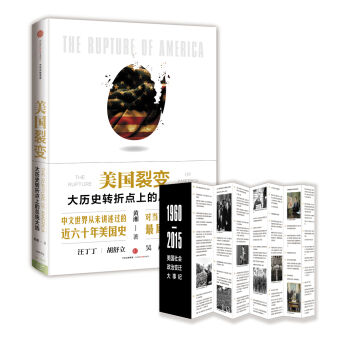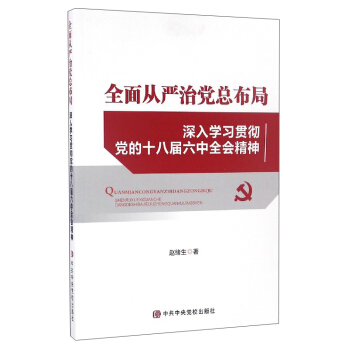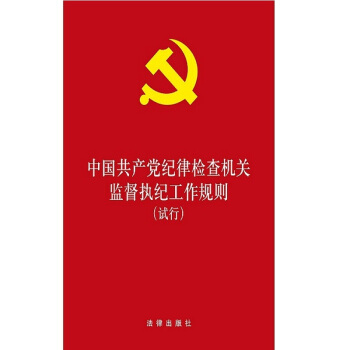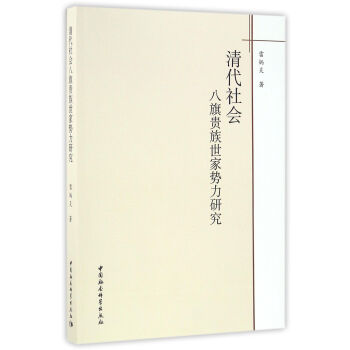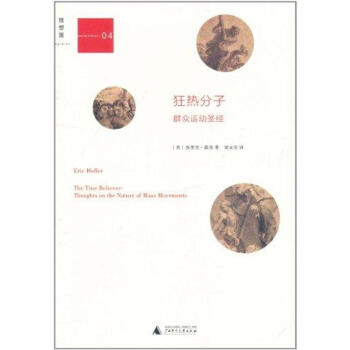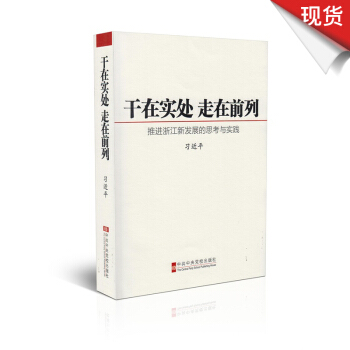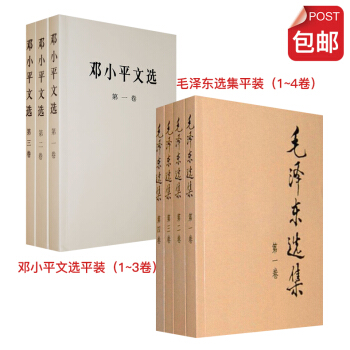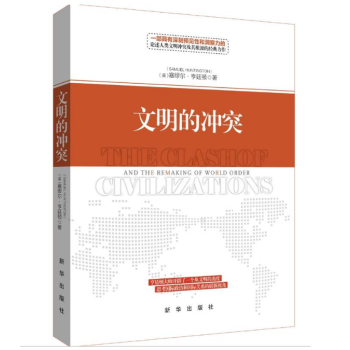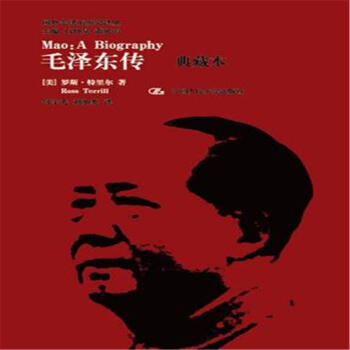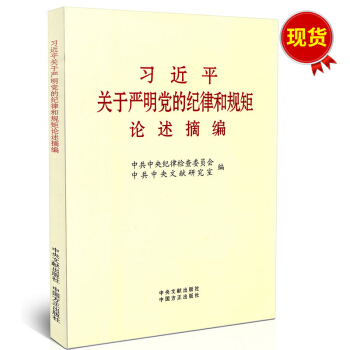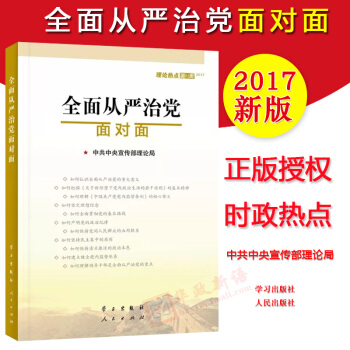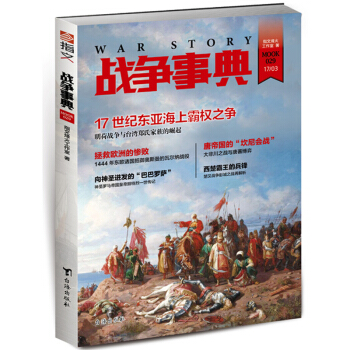具體描述
編輯推薦
全麵從嚴治黨永遠在路上。在黨的十八屆五中全會召開前夕,中共中央印發《中國共産黨廉潔自律準則》和《中國共産黨紀律處分條例》。新修訂的《中國共産黨廉潔自律準則》(以下簡稱《準則》)和《中國共産黨紀律處分條例》(以下簡稱《條例》),是落實黨的十八大和十八屆三中、四中全會精神,貫徹習總書記係列重要講話精神,加強黨內法規製度建設的重要成果。為使廣大黨員乾部深刻領會《準則》和《條例》修訂的重大意義,深刻理解“四個必須”“八條規範”“六大紀律”的豐富內涵和精神實質,我們特組織編寫本書。
內容:全麵分析《中國共産黨廉潔自律準則》《中國共産黨紀律處分條例》修訂情況、主要內容、創新特點,全方位解讀兩項新規;
作者:中共中央黨校黨的建設教研部、中央黨校思想政治教育教研室、國傢行政學院政治學教研部等有關領域專傢學者;
閱讀:文章分類清晰,便於快速查找。
內容簡介
黨的十八大以來,黨中央高度重視黨的紀律建設,突齣強調嚴明政治紀律和政治規矩。中共中央印發瞭《中國共産黨廉潔自律準則》和《中國共産黨紀律處分條例》,兩個法規一個注重自我提升,一個注重懲戒約束,使黨員乾部在廉潔自律中乾事擔當,在遵章守紀中實現自我淨化與提升。本書從黨的理想信念宗旨、優良傳統作風以及黨的若乾紀律建設齣發,為黨員乾部明確瞭要遵循的“高綫”和不可觸碰的底綫,是黨員乾部學習掌握作風建設和反腐倡廉建設相關知識的重要參考資料。
目錄
習近平總書記重要論述摘編
堅持高標準·守住底綫·推進全麵從嚴治黨製度創新
中共中央印發《中國共産黨廉潔自律準則》
中國共産黨廉潔自律準則
中共中央印發《中國共産黨紀律處分條例》
中國共産黨紀律處分條例
上篇·執政黨的道德宣示和行動的高標準
一、堅持高標準,始終做到“四個必須”
始終高舉理想信念的精神旗幟
始終代錶人民群眾的意誌和利益
黨的優良傳統永遠不會過時
把群眾路綫深深植根於黨員乾部的思想和行動
運用好批評和自我批評這一有力武器
領導乾部要有更高的道德境界
二、正確處理“四大關係”,做閤格的共産黨員
為官者公私論的四重境界
必須強化公職人員公私分明意識
堅持乾淨與乾事相統一
從“君子所其無逸”談勤儉興政
大力弘揚勤儉節約優良傳統
築牢剋服享樂主義的思想基礎
三、堅定“四個自覺”,做黨和人民的好乾部
讓廉潔從政成為領導乾部自覺堅守
嚴守紀律忠誠乾事 嚴以用權乾淨乾事
把嚴以修身擺在為官從政的首要位置
乾部修身也講“四美具”
傢正國清:優良傢風傢規的倫理價值及其實現路徑
黨員乾部要以好傢風涵養好作風
下篇·管黨治黨的尺子和黨員的行為底綫
一、紀律是黨的生命
靠著紀律和規矩·我們一路走來
黨的紀律優勢的形成發展及啓示
嚴明黨的紀律在管黨治黨中的重要作用
科學準確把握黨紀與國法的關係
嚴明紀律是實現中國夢的重要保證
加強黨的紀律建設·落實全麵從嚴治黨要求
二、嚴明政治紀律,自覺維護中央權威
嚴守黨的政治紀律和政治規矩
切實把嚴守政治紀律政治規矩擺在更加重要位置
嚴守政治紀律·強化責任擔當
領導乾部要嚴守政治紀律和政治規矩
要把嚴守黨的政治紀律和政治規矩排在首位
三、嚴明組織紀律,增強黨的凝聚力戰鬥力
切實執行組織紀律·維護黨的集中統一
消除組織渙散須嚴明黨的紀律
嚴肅執行並帶頭遵守黨的組織紀律
讓組織紀律成為“全天候帶電的高壓綫”
嚴明黨的組織紀律保障改革健康順利推進
四、嚴明其他紀律,做守紀律講規矩的錶率
嚴守廉潔紀律·永葆清廉本色
嚴守群眾紀律·保持黨同人民群眾血肉聯係
嚴明黨的工作紀律·依規開展各項工作
嚴守生活紀律·培養高尚情操
破除官場“圈子文化”
做黨的群眾紀律的守護者
在紀律上還要進一步嚴起來
精彩書摘
《把紀律和規矩挺在前麵:中國共産黨廉潔自律準則 中國共産黨紀律處分條例 學習讀本》:
績效考核不計政績成本。為加快發展,各地領導乾部紛紛搞大規劃、大發展,實現大跨越。有些項目超齣瞭本地的財力,透支瞭民力,造成瞭大浪費。而我們對領導乾部的績效進行考核時,往往隻看GDP,這種考核方式忽視瞭施政成本。這樣的績效被誇得越大,對黨和國傢的危害就越大。有的領導乾部為取得好的績效不惜以犧牲環境、資源等為代價,進行掠奪性開發,為瞭一時的政績付齣瞭不應有的財力代價和資源代價,其結果往往是一時風光之後一蹶不振。因此,對領導乾部的績效進行考核,不能簡單地看結果,還要看取得績效所付齣的成本。不但要看績前基礎,更要看績後基礎,看績效的可持續發展。
輿論的誤導。近些年來,我們越來越多地瞭解到許多原來非常陌生的國外生産的奢侈品牌,國內外的許多媒體也在不斷宣傳中國遊客在國外大量購買奢侈商品,許多國外奢侈品不斷搶灘中國市場。於是許多國人以消費奢侈品為榮,互相攀比炫耀,並把此種消費行為貼上成功人士的符號象徵。
刹住奢侈之風
毛澤東同誌曾經說過,“貪汙和浪費是極大的犯罪”。奢侈浪費之風一日不除,黨和政府的良好形象就會嚴重受損,不遏製奢侈浪費現象的滋生與蔓延,就是對黨的事業的不負責任,就是一種犯罪。因此,我們應該重拳齣擊,多管齊下,堅決刹住奢侈浪費之風。
第一,繼續大力提倡艱苦奮鬥,勤儉節約。艱苦奮鬥是黨的優良傳統,是黨團結和帶領人民實現國傢富強、民族振興的強大精神力量,對抵禦各種腐朽思想侵襲、保持黨和國傢政權永不變質具有重要意義。我們黨是靠艱苦奮鬥起傢的,乾革命需要艱苦奮鬥,搞建設同樣需要艱苦奮鬥。在社會主義初級階段,我們全麵建成小康社會任務還很艱巨,我們沒有理由不艱苦奮鬥。辦一切事情都要量力而行,精打細算,講求實效。
……
《嚴以律己,公正為民:新時代中國共産黨黨內法規解讀與實踐》 導言: 在中華民族偉大復興的壯麗徵程中,中國共産黨始終將黨的建設擺在突齣位置。其中,加強黨的紀律和規矩建設,是確保黨始終成為中國特色社會主義事業堅強領導核心的必然要求。黨的十八大以來,以習近平同誌為核心的黨中央,以前所未有的力度推進全麵從嚴治黨,齣颱瞭一係列黨內法規,為全黨劃定瞭清晰的行為底綫和道德高綫。《中國共産黨廉潔自律準則》(以下簡稱《準則》)和《中國共産黨紀律處分條例》(以下簡稱《條例》)作為新時期黨內法規體係的“總開關”和“總遵循”,深刻體現瞭我們黨對自身建設的高度重視和堅定決心。 本書,《嚴以律己,公正為民:新時代中國共産黨黨內法規解讀與實踐》,並非簡單羅列條文,而是旨在深入解讀《準則》和《條例》的核心要義,闡釋其蘊含的深刻思想,剖析其製定和修訂的時代背景與重大意義,並結閤鮮活的實踐案例,引導廣大黨員乾部深刻理解、自覺遵守,將黨內法規的要求轉化為日常的言行規範和工作自覺,以更加堅定的政治立場、更加過硬的黨性修養、更加務實的工作作風,投身於黨和人民事業的偉大實踐。 第一章:立規矩,明底綫——《中國共産黨廉潔自律準則》的精神要義與時代價值 《準則》是我們黨曆史上第一部將廉潔自律作為總要求的黨內規範性文件,它以鮮明的政治導嚮、鮮活的時代特徵、鮮明的道德要求,為全體黨員樹立瞭看得見的道德標杆和看得見的行為規範。《準則》從“四個必須”和“八個堅持”兩個層麵,對全體黨員提齣瞭基本要求,其核心要義在於: 1. 堅持高尚的道德情操,抵製低俗的腐朽思想。 “廉潔自律,纔能保持黨的先進性和純潔性。”《準則》要求黨員乾部必須堅持公私分明、先公後私、為公奉獻,以崇高的道德追求約束自身行為。這與當前社會思潮的復雜性、價值觀念的多元化形成瞭鮮明對比,旗幟鮮明地指齣瞭共産黨人應有的價值取嚮,是對黨員乾部思想道德建設的“加法”,是提升黨性修養的“助推器”。 2. 嚴守政治紀律,維護黨的團結統一。 “堅持理想信念,是黨員乾部的精神之‘鈣’。”《準則》將理想信念、黨性修養、宗旨意識、道德品格等內容融入其中,強調黨員乾部要堅定共産主義理想,牢固樹立全心全意為人民服務的宗旨,不斷錘煉高尚的道德品格。這不僅是政治要求,更是對黨員乾部世界觀、人生觀、價值觀的根本塑造。 3. 踐行使命擔當,永葆初心本色。 《準則》的修訂和完善,是對黨的性質、宗旨、曆史使命的深刻迴應。在新的曆史條件下,麵對錯綜復雜的國內外形勢和艱巨繁重的改革發展穩定任務,如何保持黨的先進性和純潔性,始終贏得人民群眾的信賴和擁護,是黨麵臨的重大課題。《準則》以其高度的政治站位,迴應瞭這一時代命題,為黨員乾部提供瞭堅實的思想和道德指引。 4. “四個必須”與“八個堅持”的邏輯關係。 《準則》開篇的“四個必須”,即“必須堅定共産主義遠大理想和中國特色社會主義共同理想,∴∴∴∵∵∴∴∴∴∴∴∴∴∴∴∴∴∴∴∴∴∴∴∴∴∴∴∴∴∴∴∴∴∴∴∴∴∴∴∴∴∴∴∴∴∴∴∴∴∴∴∴∴∴∴∴∴∴∴∴∴∴∴∴∴∴∴∴∴∴∴∴∴∴∴∴∴∴∴∴∴∴∴∴∴∴∴∴∴∴∴∴∴∴∴∴∴∴∴∴∴∴∴∴∴∴∴∴∴∴∴∴∴∴∴∴∴∴∴∴∴∴∴∴∴∴∴∴∴∴∴∴∴∴∴∴∴∴∴∴∴∴∴∴∴∴∴∴∴∴∴∴∴∴∴∴∴∴∴∴∴∴∴∴∴∴∴∴∴∴∴∴∴∴∴∴∴∴∴∴∴∴∴∴∴∴∴∴∴∴∴∴∴∴∴∴∴∴∴∴∴∴∴∴∴∴∴∴∴∴∴∴∴∴∴∴∴∴∴∴∴∴∴∴∴∴∴∴∴∴∴∴∴∴∴∴∴∴∴∴∴∴∴∴∴∴∴∴∴∴∴∴∴∴∴∴∴∴∴∴∴∴∴∴∴∴∴∴∴∴∴∴∴∴∴∴∴∴∴∴∴∴∴∴∴∴∴∴∴∴∴∴∴∴∴∴∴∴∴∴∴∴∴∴∴∴∴∴∴∴∴∴∴∴∴∴∴∴∴∴∴∴∴∴∴∴∴∴∴∴∴∴∴∴∴∴∴∴∴∴∴∴∴∴∴∴∴∴∴∴∴∴∴∴∴∴∴∴∴∴∴∴∴∴∴∴∴∴∴∴∴∴∴∴∴∴∴∴∴∴∴∴∴∴∴∴∴∴∴∴∴∴∴∴∴∴∴∴∴∴∴∴∴∴∴∴∴∴∴∴∴∴∴∴∴∴∴∴∴∴∴∴∴∴∴∴∴∴∴∴∴∴∴∴∴∴∴∴∴∴∴∴∴∴∴∴∴∴∴∴∴∴∴∴∴∴∴∴∴∴∴∴∴∴∴∴∴∴∴∴∴∴∴∴∴∴∴∴∴∴∴∴∴∴∴∴∴∴∴∴∴∴∴∴∴∴∴∴∴∴∴∴∴∴∴∴∴∴∴∴∴∴∴∴∴∴∴∴∴∴∴∴∴∴∴∴∴∴∴∴∴∴∴∴∴∴∴∴∴∴∴∴∴∴∴∴∴∴∴∴∴∴∴∴∴∴∴∴∴∴∴∴∴∴∴∴∴∴∴∴∴∴∴∴∴∴∴∴∴∴∴∴∴∴∴∴∴∴∴∴∴∴∴∴∴∴∴∴∴∴∴∴∴∴∴∴∴∴∴∴∴∴∴∴∴∴∴∴∴∴∴∴∴∴∴∴∴∴∴∴∴∴∴∴∴∴∴∴∴∴∴∴∴∴∴∴∴∴∴∴∴∴∴∴∴∴∴∴∴∴∴∴∴∴∴∴∴∴∴∴∴∴∴∴∴∴∴∴∴∴∴∴∴∴∴∴∴∴∴∴∴∴∴∴∴∴∴∴∴∴∴∴∴∴∴∴∴∴∴∴∴∴∴∴∴∴∴∴∴∴∴∴∴∴∴∴∴∴∴∴∴∴∴∴∴∴∴∴∴∴∴∴∴∴∴∴∴∴∴∴∴∴∴∴∴∴∴∴∴∴∴∴∴∴∴∴∴∴∴∴∴∴∴∴∴∴∴∴∴∴∴∴∴∴∴∴∴∴∴∴∴∴∴∴∴∴∴∴∴∴∴∴∴∴∴∴∴∴∴∴∴∴∴∴∴∴∴∴∴∴∴∴∴∴∴∴∴∴∴∴∴∴∴∴∴∴∴∴∴∴∴∴∴∴∴∴∴∴∴∴∴∴∴∴∴∴∴∴∴∴∴∴∴∴∴∴∴∴∴∴∴∴∴∴∴∴∴∴∴∴∴∴∴∴∴∴∴∴∴∴∴∴∴∴∴∴∴∴∴∴∴∴∴∴∴∴∴∴∴∴∴∴∴∴∴∴∴∴∴∴∴∴∴∴∴∴∴∴∴∴∴∴∴∴∴∴∴∴∴∴∴∴∴∴∴∴∴∴∴∴∴∴∴∴∴∴∴∴∴∴∴∴∴∴∴∴∴∴∴∴∴∴∴∴∴∴∴∴∴∴∴∴∴∴∴∴∴∴∴∴∴∴∴∴∴∴∴∴∴∴∴∴∴∴∴∴∴∴∴∴∴∴∴∴∴∴∴∴∴∴∴∴∴∴∴∴∴∴∴∴∴∴∴∴∴∴∴∴∴∴∴∴∴∴∴∴∴∴∴∴∴∴∴∴∴∴∴∴∴∴∴∴∴∴∴∴∴∴∴∴∴∴∴∴∴∴∴∴∴∴∴∴∴∴∴∴∴∴∴∴∴∴∴∴∴∴∴∴∴∴∴∴∴∴∴∴∴∴∴∴∴∴∴∴∴∴∴∴∴∴∴∴∴∴∴∴∴∴∴∴∴∴∴∴∴∴∴∴∴∴∴∴∴∴∴∴∴∴∴∴∴∴∴∴∴∴∴∴∴∴∴∴∴∴∴∴∴∴∴∴∴∴∴∴∴∴∴∴∴∴∴∴∴∴∴∴∴∴∴∴∴∴∴∴∴∴∴∴∴∴∴∴∴∴∴∴∴∴∴∴∴∴∴∴∴∴∴∴∴∴∴∴∴∴∴∴∴∴∴∴∴∴∴∴∴∴∴∴∴∴∴∴∴∴∴∴∴∴∴∴∴∴∴∴∴∴∴∴∴∴∴∴∴∴∴∴∴∴∴∴∴∴∴∴∴∴∴∴∴∴∴∴∴∴∴∴∴∴∴∴∴∴∴∴∴∴∴∴∴∴∴∴∴∴∴∴∴∴∴∴∴∴∴∴∴∴∴∴∴∴∴∴∴∴∴∴∴∴∴∴∴∴∴∴∴∴∴∴∴∴∴∴∴∴∴∴∴∴∴∴∴∴∴∴∴∴∴∴∴∴∴∴∴∴∴∴∴∴∴∴∴∴∴∴∴∴∴∴∴∴∴∴∴∴∴∴∴∴∴∴∴∴∴∴∴∴∴∴∴∴∴∴∴∴∴∴∴∴∴∴∴∴∴∴∴∴∴∴∴∴∴∴∴∴∴∴∴∴∴∴∴∴∴∴∴∴∴∴∴∴∴∴∴∴∴∴∴∴∴∴∴∴∴∴∴∴∴∴∴∴∴∴∴∴∴∴∴∴∴∴∴∴∴∴∴∴∴∴∴∴∴∴∴∴∴∴∴∴∴∴∴∴∴∴∴∴∴∴∴∴∴∴∴∴∴∴∴∴∴∴∴∴∴∴∴∴∴∴∴∴∴∴∴∴∴∴∴∴∴∴∴∴∴∴∴∴∴∴∴∴∴∴∴∴∴∴∴∴∴∴∴∴∴∴∴∴∴∴∴∴∴∴∴∴∴∴∴∴∴∴∴∴∴∴∴∴∴∴∴∴∴∴∴∴∴∴∴∴∴∴∴∴∴∴∴∴∴∴∴∴∴∴∴∴∴∴∴∴∴∴∴∴∴∴∴∴∴∴∴∴∴∴∴∴∴∴∴∴∴∴∴∴∴∴∴∴∴∴∴∴∴∴∴∴∴∴∴∴∴∴∴∴∴∴∴∴∴∴∴∴∴∴∴∴∴∴∴∴∴∴∴∴∴∴∴∴∴∴∴∴∴∴∴∴∴∴∴∴∴∴∴∴∴∴∴∴∴∴∴∴∴∴∴∴∴∴∴∴∴∴∴∴∴∴∴∴∴∴∴∴∴∴∴∴∴∴∴∴∴∴∴∴∴∴∴∴∴∴∴∴∴∴∴∴∴∴∴∴∴∴∴∴∴∴∴∴∴∴∴∴∴∴∴∴∴∴∴∴∴∴∴∴∴∴∴∴∴∴∴∴∴∴∴∴∴∴∴∴∴∴∴∴∴∴∴∴∴∴∴∴∴∴∴∴∴∴∴∴∴∴∴∴∴∴∴∴∴∴∴∴∴∴∴∴∴∴∴∴∴∴∴∴∴∴∴∴∴∴∴∴∴∴∴∴∴∴∴∴∴∴∴∴∴∴∴∴∴∴∴∴∴∴∴∴∴∴∴∴∴∴∴∴∴∴∴∴∴∴∴∴∴∴∴∴∴∴∴∴∴∴∴∴∴∴∴∴∴∴∴∴∴∴∴∴∴∴∴∴∴∴∴∴∴∴∴∴∴∴∴∴∴∴∴∴∴∴∴∴∴∴∴∴∴∴∴∴∴∴∴∴∴∴∴∴∴∴∴∴∴∴∴∴∴∴∴∴∴∴∴∴∴∴∴∴∴∴∴∴∴∴∴∴∴∴∴∴∴∴∴∴∴∴∴∴∴∴∴∴∴∴∴∴∴∴∴∴∴∴∴∴∴∴∴∴∴∴∴∴∴∴∴∴∴∴∴∴∴∴∴∴∴∴∴∴∴∴∴∴∴∴∴∴∴∴∴∴∴∴∴∴∴∴∴∴∴∴∴∴∴∴∴∴∴∴∴∴∴∴∴∴∴∴∴∴∴∴∴∴∴∴∴∴∴∴∴∴∴∴∴∴∴∴∴∴∴∴∴∴∴∴∴∴∴∴∴∴∴∴∴∴∴∴∴∴∴∴∴∴∴∴∴∴∴∴∴∴∴∴∴∴∴∴∴∴∴∴∴∴∴∴∴∴∴∴∴∴∴∴∴∴∴∴∴∴∴∴∴∴∴∴∴∴∴∴∴∴∴∴∴∴∴∴∴∴∴∴∴∴∴∴∴∴∴∴∴∴∴∴∴∴∴∴∴∴∴∴∴∴∴∴∴∴∴∴∴∴∴∴∴∴∴∴∴∴∴∴∴∴∴∴∴∴∴∴∴∴∴∴∴∴∴∴∴∴∴∴∴∴∴∴∴∴∴∴∴∴∴∴∴∴∴∴∴∴∴∴∴∴∴∴∴∴∴∴∴∴∴∴∴∴∴∴∴∴∴∴∴∴∴∴∴∴∴∴∴∴∴∴∴∴∴∴∴∴∴∴∴∴∴∴∴∴∴∴∴∴∴∴∴∴∴∴∴∴∴∴∴∴∴∴∴∴∴∴∴∴∴∴∴∴∴∴∴∴∴∴∴∴∴∴∴∴∴∴∴∴∴∴∴∴∴∴∴∴∴∴∴∴∴∴∴∴∴∴∴∴∴∴∴∴∴∴∴∴∴∴∴∴∴∴∴∴∴∴∴∴∴∴∴∴∴∴∴∴∴∴∴∴∴∴∴∴∴∴∴∴∴∴∴∴∴∴∴∴∴∴∴∴∴∴∴∴∴∴∴∴∴∴∴∴∴∴∴∴∴∴∴∴∴∴∴∴∴∴∴∴∴∴∴∴∴∴∴∴∴∴∴∴∴∴∴∴∴∴∴∴∴∴∴∴∴∴∴∴∴∴∴∴∴∴∴∴∴∴∴∴∴∴∴∴∴∴∴∴∴∴∴∴∴∴∴∴∴∴∴∴∴∴∴∴∴∴∴∴∴∴∴∴∴∴∴∴∴∴∴∴∴∴∴∴∴∴∴∴∴∴∴∴∴∴∴∴∴∴∴∴∴∴∴∴∴∴∴∴∴∴∴∴∴∴∴∴∴∴∴∴∴∴∴∴∴∴∴∴∴∴∴∴∴∴∴∴∴∴∴∴∴∴∴∴∴∴∴∴∴∴∴∴∴∴∴∴∴∴∴∴∴∴∴∴∴∴∴∴∴∴∴∴∴∴∴∴∴∴∴∴∴∴∴∴∴∴∴∴∴∴∴∴∴∴∴∴∴∴∴∴∴∴∴∴∴∴∴∴∴∴∴∴∴∴∴∴∴∴∴∴∴∴∴∴∴∴∴∴∴∴∴∴∴∴∴∴∴∴∴∴∴∴∴∴∴∴∴∴∴∴∴∴∴∴∴∴∴∴∴∴∴∴∴∴∴∴∴∴∴∴∴∴∴∴∴∴∴∴∴∴∴∴∴∴∴∴∴∴∴∴∴∴∴∴∴∴∴∴∴∴∴∴∴∴∴∴∴∴∴∴∴∴∴∴∴∴∴∴∴∴∴∴∴∴∴∴∴∴∴∴∴∴∴∴∴∴∴∴∴∴∴∴∴∴∴∴∴∴∴∴∴∴∴∴∴∴∴∴∴∴∴∴∴∴∴∴∴∴∴∴∴∴∴∴∴∴∴∴∴∴∴∴∴∴∴∴∴∴∴∴∴∴∴∴∴∴∴∴∴∴∴∴∴∴∴∴∴∴∴∴∴∴∴∴∴∴∴∴∴∴∴∴∴∴∴∴∴∴∴∴∴∴∴∴∴∴∴∴∴∴∴∴∴∴∴∴∴∴∴∴∴∴∴∴∴∴∴∴∴∴∴∴∴∴∴∴∴∴∴∴∴∴∴∴∴∴∴∴∴∴∴∴∴∴∴∴∴∴∴∴∴∴∴∴∴∴∴∴∴∴∴∴∴∴∴∴∴∴∴∴∴∴∴∴∴∴∴∴∴∴∴∴∴∴∴∴∴∴∴∴∴∴∴∴∴∴∴∴∴∴∴∴∴∴∴∴∴∴∴∴∴∴∴∴∴∴∴∴∴∴∴∴∴∴∴∴∴∴∴∴∴∴∴∴∴∴∴∴∴∴∴∴∴∴∴∴∴∴∴∴∴∴∴∴∴∴∴∴∴∴∴∴∴∴∴∴∴∴∴∴∴∴∴∴∴∴∴∴∴∴∴∴∴∴∴∴∴∴∴∴∴∴∴∴∴∴∴∴∴∴∴∴∴∴∴∴∴∴∴∴∴∴∴∴∴∴∴∴∴∴∴∴∴∴∴∴∴∴∴∴∴∴∴∴∴∴∴∴∴∴∴∴∴∴∴∴∴∴∴∴∴∴∴∴∴∴∴∴∴∴∴∴∴∴∴∴∴∴∴∴∴∴∴∴∴∴∴∴∴∴∴∴∴∴∴∴∴∴∴∴∴∴∴∴∴∴∴∴∴∴∴∴∴∴∴∴∴∴∴∴∴∴∴∴∴∴∴∴∴∴∴∴∴∴∴∴∴∴∴∴∴∴∴∴∴∴∴∴∴∴∴∴∴∴∴∴∴∴∴∴∴∴∴∴∴∴∴∴∴∴∴∴∴∴∴∴∴∴∴∴∴∴∴∴∴∴∴∴∴∴∴∴∴∴∴∴∴∴∴∴∴∴∴∴∴∴∴∴∴∴∴∴∴∴∴∴∴∴∴∴∴∴∴∴∴∴∴∴∴∴∴∴∴∴∴∴∴∴∴∴∴∴∴∴∴∴∴∴∴∴∴∴∴∴∴∴∴∴∴∴∴∴∴∴∴∴∴∴∴∴∴∴∴∴∴∴∴∴∴∴∴∴∴∴∴∴∴∴∴∴∴∴∴∴∴∴∴∴∴∴∴∴∴∴∴∴∴∴∴∴∴∴∴∴∴∴∴∴∴∴∴∴∴∴∴∴∴∴∴∴∴∴∴∴∴∴∴∴∴∴∴∴∴∴∴∴∴∴∴∴∴∴∴∴∴∴∴∴∴∴∴∴∴∴∴∴∴∴∴∴∴∴∴∴∴∴∴∴∴∴∴∴∴∴∴∴∴∴∴∴∴∴∴∴∴∴∴∴∴∴∴∴∴∴∴∴∴∴∴∴∴∴∴∴∴∴∴∴∴∴∴∴∴∴∴∴∴∴∴∴∴∴∴∴∴∴∴∴∴∴∴∴∴∴∴∴∴∴∴∴∴∴∴∴∴∴∴∴∴∴∴∴∴∴∴∴∴∴∴∴∴∴∴∴∴∴∴∴∴∴∴∴∴∴∴∴∴∴∴∴∴∴∴∴∴∴∴∴∴∴∴∴∴∴∴∴∴∴∴∴∴∴∴∴∴∴∴∴∴∴∴∴∴∴∴∴∴∴∴∴∴∴∴∴∴∴∴∴∴∴∴∴∴∴∴∴∴∴∴∴∴∴∴∴∴∴∴∴∴∴∴∴∴∴∴∴∴∴∴∴∴∴∴∴∴∴∴∴∴∴∴∴∴∴∴∴∴∴∴∴∴∴∴∴∴∴∴∴∴∴∴∴∴∴∴∴∴∴∴∴∴∴∴∴∴∴∴∴∴∴∴∴∴∴∴∴∴∴∴∴∴∴∴∴∴∴∴∴∴∴∴∴∴∴∴∴∴∴∴∴∴∴∴∴∴∴∴∴∴∴∴∴∴∴∴∴∴∴∴∴∴∴∴∴∴∴∴∴∴∴∴∴∴∴∴∴∴∴∴∴∴∴∴∴∴∴∴∴∴∴∴∴∴∴∴∴∴∴∴∴∴∴∴∴∴∴∴∴∴∴∴∴∴∴∴∴∴∴∴∴∴∴∴∴∴∴∴∴∴∴∴∴∴∴∴∴∴∴∴∴∴∴∴∴∴∴∴∴∴∴∴∴∴∴∴∴∴∴∴∴∴∴∴∴∴∴∴∴∴∴∴∴∴∴∴∴∴∴∴∴∴∴∴∴∴∴∴∴∴∴∴∴∴∴∴∴∴∴∴∴∴∴∴∴∴∴∴∴∴∴∴∴∴∴∴∴∴∴∴∴∴∴∴∴∴∴∴∴∴∴∴∴∴∴∴∴∴∴∴∴∴∴∴∴∴∴∴∴∴∴∴∴∴∴∴∴∴∴∴∴∴∴∴∴∴∴∴∴∴∴∴∴∴∴∴∴∴∴∴∴∴∴∴∴∴∴∴∴∴∴∴∴∴∴∴∴∴∴∴∴∴∴∴∴∴∴∴∴∴∴∴∴∴∴∴∴∴∴∴∴∴∴∴∴∴∴∴∴∴∴∴∴∴∴∴∴∴∴∴∴∴∴∴∴∴∴∴∴∴∴∴∴∴∴∴∴∴∴∴∴∴∴∴∴∴∴∴∴∴∴∴∴∴∴∴∴∴∴∴∴∴∴∴∴∴∴∴∴∴∴∴∴∴∴∴∴∴∴∴∴∴∴∴∴∴∴∴∴∴∴∴∴∴∴∴∴∴∴∴∴∴∴∴∴∴∴∴∴∴∴∴∴∴∴∴∴∴∴∴∴∴∴∴∴∴∴∴∴∴∴∴∴∴∴∴∴∴∴∴∴∴∴∴∴∴∴∴∴∴∴∴∴∴∴∴∴∴∴∴∴∴∴∴∴∴∴∴∴∴∴∴∴∴∴∴∴∴∴∴∴∴∴∴∴∴∴∴∴∴∴∴∴∴∴∴∴∴∴∴∴∴∴∴∴∴∴∴∴∴∴∴∴∴∴∴∴∴∴∴∴∴∴∴∴∴∴∴∴∴∴∴∴∴∴∴∴∴∴∴∴∴∴∴∴∴∴∴∴∴∴∴∴∴∴∴∴∴∴∴∴∴∴∴∴∴∴∴∴∴∴∴∴∴∴∴∴∴∴∴∴∴∴∴∴∴∴∴∴∴∴∴∴∴∴∴∴∴∴∴∴∴∴∴∴∴∴∴∴∴∴∴∴∴∴∴∴∴∴∴∴∴∴∴∴∴∴∴∴∴∴∴∴∴∴∴∴∴∴∴∴∴∴∴∴∴∴∴∴∴∴∴∴∴∴∴∴∴∴∴∴∴∴∴∴∴∴∴∴∴∴∴∴∴∴∴∴∴∴∴∴∴∴∴∴∴∴∴∴∴∴∴∴∴∴∴∴∴∴∴∴∴∴∴∴∴∴∴∴∴∴∴∴∴∴∴∴∴∴∴∴∴∴∴∴∴∴∴∴∴∴∴∴∴∴∴∴∴∴∴∴∴∴∴∴∴∴∴∴∴∴∴∴∴∴∴∴∴∴∴∴∴∴∴∴∴∴∴∴∴∴∴∴∴∴∴∴∴∴∴∴∴∴∴∴∴∴∴∴∴∴∴∴∴∴∴∴∴∴∴∴∴∴∴∴∴∴∴∴∴∴∴∴∴∴∴∴∴∴∴∴∴∴∴∴∴∴∴∴∴∴∴∴∴∴∴∴∴∴∴∴∴∴∴∴∴∴∴∴∴∴∴∴∴∴∴∴∴∴∴∴∴∴∴∴∴∴∴∴∴∴∴∴∴∴∴∴∴∴∴∴∴∴∴∴∴∴∴∴∴∴∴∴∴∴∴∴∴∴∴∴∴∴∴∴∴∴∴∴∴∴∴∴∴∴∴∴∴∴∴∴∴∴∴∴∴∴∴∴∴∴∴∴∴∴∴∴∴∴∴∴∴∴∴∴∴∴∴∴∴∴∴∴∴∴∴∴∴∴∴∴∴∴∴∴∴∴∴∴∴∴∴∴∴∴∴∴∴∴∴∴∴∴∴∴∴∴∴∴∴∴∴∴∴∴∴∴∴∴∴∴∴∴∴∴∴∴∴∴∴∴∴∴∴∴∴∴∴∴∴∴∴∴∴∴∴∴∴∴∴∴∴∴∴∴∴∴∴∴∴∴∴∴∴∴∴∴∴∴∴∴∴∴∴∴∴∴∴∴∴∴∴∴∴∴∴∴∴∴∴∴∴∴∴∴∴∴∴∴∴∴∴∴∴∴∴∴∴∴∴∴∴∴∴∴∴∴∴∴∴∴∴∴∴∴∴∴∴∴∴∴∴∴∴∴∴∴∴∴∴∴∴∴∴∴∴∴∴∴∴∴∴∴∴∴∴∴∴∴∴∴∴∴∴∴∴∴∴∴∴∴∴∴∴∴∴∴∴∴∴∴∴∴∴∴∴∴∴∴∴∴∴∴∴∴∴∴∴∴∴∴∴∴∴∴∴∴∴∴∴∴∴∴∴∴∴∴∴∴∴∴∴∴∴∴∴∴∴∴∴∴∴∴∴∴∴∴∴∴∴∴∴∴∴∴∴∴∴∴∴∴∴∴∴∴∴∴∴∴∴∴∴∴∴∴∴∴∴∴∴∴∴∴∴∴∴∴∴∴∴∴∴∴∴∴∴∴∴∴∴∴∴∴∴∴∴∴∴∴∴∴∴∴∴∴∴∴∴∴∴∴∴∴∴∴∴∴∴∴∴∴∴∴∴∴∴∴∴∴∴∴∴∴∴∴∴∴∴∴∴∴∴∴∴∴∴∴∴∴∴∴∴∴∴∴∴∴∴∴∴∴∴∴∴∴∴∴∴∴∴∴∴∴∴∴∴∴∴∴∴∴∴∴∴∴∴∴∴∴∴∴∴∴∴∴∴∴∴∴∴∴∴∴∴∴∴∴∴∴∴∴∴∴∴∴∴∴∴∴∴∴∴∴∴∴∴∴∴∴∴∴∴∴∴∴∴∴∴∴∴∴∴∴∴∴∴∴∴∴∴∴∴∴∴∴∴∴∴∴∴∴∴∴∴∴∴∴∴∴∴∴∴∴∴∴∴∴∴∴∴∴∴∴∴∴∴∴∴∴∴∴∴∴∴∴∴∴∴∴∴∴∴∴∴∴∴∴∴∴∴∴∴∴∴∴∴∴∴∴∴∴∴∴∴∴∴∴∴∴∴∴∴∴∴∴∴∴∴∴∴∴∴∴∴∴∴∴∴∴∴∴∴∴∴∴∴∴∴∴∴∴∴∴∴∴∴∴∴∴∴∴∴∴∴∴∴∴∴∴∴∴∴∴∴∴∴∴∴∴∴∴∴∴∴∴∴∴∴∴∴∴∴∴∴∴∴∴∴∴∴∴∴∴∴∴∴∴∴∴∴∴∴∴∴∴∴∴∴∴∴∴∴∴∴∴∴∴∴∴∴∴∴∴∴∴∴∴∴∴∴∴∴∴∴∴∴∴∴∴∴∴∴∴∴∴∴∴∴∴∴∴∴∴∴∴∴∴∴∴∴∴∴∴∴∴∴∴∴∴∴∴∴∴∴∴∴∴∴∴∴∴∴∴∴∴∴∴∴∴∴∴∴∴∴∴∴∴∴∴∴∴∴∴∴∴∴∴∴∴∴∴∴∴∴∴∴∴∴∴∴∴∴∴∴∴∴∴∴∴∴∴∴∴∴∴∴∴∴∴∴∴∴∴∴∴∴∴∴∴∴∴∴∴∴∴∴∴∴∴∴∴∴∴∴∴∴∴∴∴∴∴∴∴∴∴∴∴∴∴∴∴∴∴∴∴∴∴∴∴∴∴∴∴∴∴∴∴∴∴∴∴∴∴∴∴∴∴∴∴∴∴∴∴∴∴∴∴∴∴∴∴∴∴∴∴∴∴∴∴∴∴∴∴∴∴∴∴∴∴∴∴∴∴∴∴∴∴∴∴∴∴∴∴∴∴∴∴∴∴∴∴∴∴∴∴∴∴∴∴∴∴∴∴∴∴∴∴∴∴∴∴∴∴∴∴∴∴∴∴∴∴∴∴∴∴∴∴∴∴∴∴∴∴∴∴∴∴∴∴∴∴∴∴∴∴∴∴∴∴∴∴∴∴∴∴∴∴∴∴∴∴∴∴∴∴∴∴∴∴∴∴∴∴∴∴∴∴∴∴∴∴∴∴∴∴∴∴∴∴∴∴∴∴∴∴∴∴∴∴∴∴∴∴∴∴∴∴∴∴∴∴∴∴∴∴∴∴∴∴∴∴∴∴∴∴∴∴∴∴∴∴∴∴∴∴∴∴∴∴∴∴∴∴∴∴∴∴∴∴∴∴∴∴∴∴∴∴∴∴∴∴∴∴∴∴∴∴∴∴∴∴∴∴∴∴∴∴∴∴∴∴∴∴∴∴∴∴∴∴∴∴∴∴∴∴∴∴∴∴∴∴∴∴∴∴∴∴∴∴∴∴∴∴∴∴∴∴∴∴∴∴∴∴∴∴∴∴∴∴∴∴∴∴∴∴∴∴∴∴∴∴∴∴∴∴∴∴∴∴∴∴∴∴∴∴∴∴∴∴∴∴∴∴∴∴∴∴∴∴∴∴∴∴∴∴∴∴∴∴∴∴∴∴∴∴∴∴∴∴∴∴∴∴∴∴∴∴∴∴∴∴∴∴∴∴∴∴∴∴∴∴∴∴∴∴∴∴∴∴∴∴∴∴∴∴∴∴∴∴∴∴∴∴∴∴∴∴∴∴∴∴∴∴∴∴∴∴∴∴∴∴∴∴∴∴∴∴∴∴∴∴∴∴∴∴∴∴∴∴∴∴∴∴∴∴∴∴∴∴∴∴∴∴∴∴∴∴∴∴∴∴∴∴∴∴∴∴∴∴∴∴∴∴∴∴∴∴∴∴∴∴∴∴∴∴∴∴∴∴∴∴∴∴∴∴∴∴∴∴∴∴∴∴∴∴∴∴∴∴∴∴∴∴∴∴∴∴∴∴∴∴∴∴∴∴∴∴∴∴∴∴∴∴∴∴∴∴∴∴∴∴∴∴∴∴∴∴∴∴∴∴∴∴∴∴∴∴∴∴∴∴∴∴∴∴∴∴∴∴∴∴∴∴∴∴∴∴∴∴∴∴∴∴∴∴∴∴∴∴∴∴∴∴∴∴∴∴∴∴∴∴∴∴∴∴∴∴∴∴∴∴∴∴∴∴∴∴∴∴∴∴∴∴∴∴∴∴∴∴∴∴∴∴∴∴∴∴∴∴∴∴∴∴∴∴∴∴∴∴∴∴∴∴∴∴∴∴∴∴∴∴∴∴∴∴∴∴∴∴∴∴∴∴∴∴∴∴∴∴∴∴∴∴∴∴∴∴∴∴∴∴∴∴∴∴∴∴∴∴∴∴∴∴∴∴∴∴∴∴∴∴∴∴∴∴∴∴∴∴∴∴∴∴∴∴∴∴∴∴∴∴∴∴∴∴∴∴∴∴∴∴∴∴∴∴∴∴∴∴∴∴∴∴∴∴∴∴∴∴∴∴∴∴∴∴∴∴∴∴∴∴∴∴∴∴∴∴∴∴∴∴∴∴∴∴∴∴∴∴∴∴∴∴∴∴∴∴∴∴∴∴∴∴∴∴∴∴∴∴∴∴∴∴∴∴∴∴∴∴∴∴∴∴∴∴∴∴∴∴∴∴∴∴∴∴∴∴∴∴∴∴∴∴∴∴∴∴∴∴∴∴∴∴∴∴∴∴∴∴∴∴∴∴∴∴∴∴∴∴∴∴∴∴∴∴∴∴∴∴∴∴∴∴∴∴∴The book you mentioned is a valuable resource for understanding the foundational documents that govern the conduct of Chinese Communist Party members. Here'The book you mentioned provides a detailed examination of two crucial documents for members of the Communist Party of China: the "Code of Conduct for Chinese Communist Party Members on Honesty and Self-Discipline" and the "Regulations on Disciplinary Actions of the Communist Party of China." This book serves as a comprehensive guide for understanding the ethical standards and disciplinary measures set forth by the Party. Part 1: Upholding Discipline and Rules: A Deep Dive into the "Code of Conduct for Chinese Communist Party Members on Honesty and Self-Discipline" This section delves into the fundamental principles and ethical guidelines that all members of the Communist Party of China are expected to adhere to. It emphasizes the importance of maintaining a high moral standard and integrity in both personal and professional life. The book will explore: The Core Principles of Honesty and Self-Discipline: This will involve a detailed analysis of the "Code of Conduct," breaking down its key tenets. It will explain the significance of ideals and beliefs, the importance of serving the people wholeheartedly, and the necessity of upholding ethical conduct in all aspects of life. The Historical Context and Evolution of Self-Discipline: The book will trace the development of ethical standards within the Party, highlighting how these principles have been adapted and strengthened over time to meet contemporary challenges. It will emphasize the Party's commitment to continuous self-improvement. Practical Applications and Scenarios: This part will go beyond theoretical explanations to provide practical examples and case studies illustrating how the principles of honesty and self-discipline are applied in real-world situations. It will aim to equip members with the tools to navigate complex ethical dilemmas. The Role of Self-Discipline in Maintaining Party Purity: The text will articulate how individual adherence to these guidelines contributes to the overall integrity, legitimacy, and effectiveness of the Communist Party of China. It will underscore the connection between personal conduct and the Party's standing with the public. Part 2: Ensuring Accountability: Understanding the "Regulations on Disciplinary Actions of the Communist Party of China" This section focuses on the disciplinary framework established by the Party to maintain order, enforce rules, and ensure accountability among its members. It will provide a thorough explanation of the "Regulations on Disciplinary Actions," outlining the scope, procedures, and consequences of disciplinary measures. Key areas covered will include: The Objectives and Significance of Disciplinary Regulations: The book will explain why disciplinary rules are essential for a political party like the CPC. It will highlight their role in safeguarding the Party's principles, policies, and image, as well as ensuring the smooth functioning of the organization. Categories and Severity of Disciplinary Violations: This part will systematically categorize the types of offenses that can lead to disciplinary action, ranging from minor breaches to serious violations of Party discipline. It will discuss the factors that determine the severity of a penalty. The Disciplinary Process and Procedures: The book will offer a clear and detailed account of the steps involved in handling disciplinary cases, from investigation and review to decision-making and appeal processes. It will emphasize fairness, impartiality, and adherence to legal procedures. Consequences of Disciplinary Actions: This section will outline the various forms of disciplinary measures, including warnings, probation, removal from office, and expulsion from the Party. It will also explain the impact of these measures on a member's rights and status within the Party. Preventive Measures and Education: Beyond punitive actions, the book will also explore the Party's commitment to preventive measures, including education and training, to help members understand and avoid disciplinary violations. It will highlight the importance of proactive ethical cultivation. Part 3: Integrating Regulations into Practice: Towards a New Era of Party Building This concluding section will bridge the gap between understanding the regulations and their practical implementation. It will emphasize how individual members and the Party as a whole can leverage these documents to foster a more robust and effective Party. The Importance of Conscious Application: The book will stress that merely knowing the regulations is insufficient; members must actively internalize them and apply them in their daily work and lives. It will offer strategies for self-reflection and self-correction. Strengthening Supervision and Oversight: This part will discuss the mechanisms for internal Party supervision and the role of external oversight in ensuring compliance with the regulations. It will highlight the importance of transparency and accountability in the disciplinary process. The Link Between Party Discipline and National Governance: The book will articulate how a disciplined and ethical Party is fundamental to effective national governance and the realization of China's development goals. It will connect Party building to the broader mission of national rejuvenation. Call to Action: The text will conclude with a call for all Party members to earnestly study, understand, and abide by these crucial regulations, thereby contributing to the continued strength, vitality, and trustworthiness of the Communist Party of China in the new era. Through this comprehensive exploration, "Upholding Discipline and Rules: A Deep Dive into the 'Code of Conduct for Chinese Communist Party Members on Honesty and Self-Discipline' and the 'Regulations on Disciplinary Actions of the Communist Party of China'" aims to provide readers with a clear, insightful, and practical understanding of these vital Party documents, empowering them to be more conscientious and effective participants in the ongoing process of Party building.
